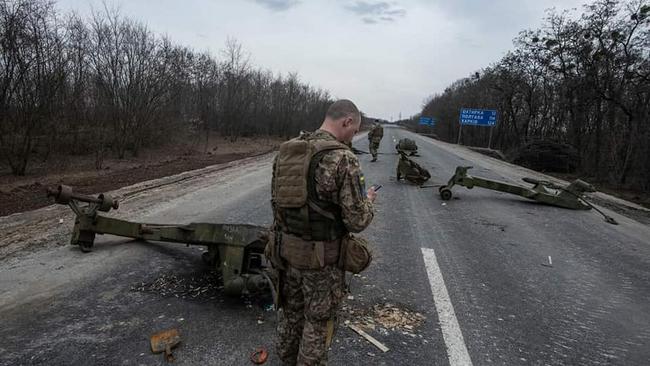Spy list reveals the names and details of 620 Kremlin agents
If authentic, the release would constitute a huge data breach at the agency which Vladimir Putin led from 1998 to 1999.

The names and addresses of 620 people who are said to be FSB officers have been published in what Kyiv said was a huge data breach of the Russian security agency.
The Ukrainian directorate of intelligence claimed late on Monday that the list included the personal details of agents engaging in “criminal activities” across Europe.
As well as names and addresses, the list also includes details of agents’ cars, their numberplates, mobile phone numbers, and dates and places of birth.
All those on the list were registered as living in the Lubyanka, the service’s Moscow headquarters. The FSB is Russia’s domestic security service, akin to ASIO, but its remit also encompasses countries of the former Soviet Union, including Ukraine.
If authentic, the release would constitute a huge data breach at the spy agency, of which President Vladimir Putin was director from 1998 to 1999.
It is not the first time that the FSB’s security has been compromised in recent weeks. Earlier this month Ukrainian intelligence forces were able to intercept a phone call between two agents, discussing the death of a Russian general.
Rather than using the service’s secure communication channel, Era, which was introduced to much fanfare last year, they were speaking using ordinary SIM cards. It is thought that the FSB, which was responsible for intelligence gathering in Ukraine in the lead-up to the war, is being blamed for the failures of the invasion.
Two weeks ago Sergey Beseda, head of the FSB’s foreign intelligence branch, was arrested with Anatoly Bolyukh, his deputy. The homes of dozens of other officers were also raided.
Andrei Soldatov, an expert on Russian espionage, said that the final reports produced by the FSB on Ukraine in the run-up to the invasion were “simply not right, which is part of the reason as to why things have gone so badly for Russia”.
Their assessments of popular support among Ukrainians for a Russian invasion and the extent to which the country would resist were “terribly miscalculated”, he said. However, he added: “The problem is that it is too risky for superiors to tell Putin what he doesn’t want to hear, so they tailor their information.
“The tailoring probably takes place somewhere between the rank of colonel and general in the FSB. We can’t rule out the fact that the intelligence they gathered on the ground was in fact very good.”
The director of the FSB is Aleksandr Bortnikov. One of the most powerful men in Russia, General Bortnikov has known Mr Putin since the 1970s when both men were stationed together in St Petersburg. He is a member of the siloviki, or strong men, the network of former security services officials who form Mr Putin’s inner circle in the Kremlin. Like others in the group, General Bortnikov’s proximity to power has helped to enrich his family.
His son Denis is the deputy president of VTB, the second-largest bank in Russia, and was among the first men to be sanctioned by Britain following the invasion of Ukraine.
Mr Putin has reportedly become frustrated with the performance of the siloviki in recent weeks. Defence Minister Sergei Shoigu disappeared for almost a fortnight amid rumours that he had suffered a heart attack after a confrontation with Mr Putin.
An image of General Shoigu appeared briefly on state television at the weekend and Foreign Minister Sergei Lavrov dismissed the reports of his ill health late on Monday as “rubbish”. He blamed Ukrainian intelligence and “Russian expatriate neoliberals” for spreading the rumours.
“Everyone is alive, everyone is healthy and everyone is working normally, as you can see on the TV, on social media,” he said.
Despite its sophisticated cyber capabilities, Russia has suffered a number of hacks since the outbreak of the war.
Anonymous, an international group of hackers, has claimed responsibility for a series of leaks. Earlier this month, the group said that it had seized control of Russian state television for 12 minutes to broadcast images of the war in Ukraine. The collective also claimed responsibility for an attack on Russia’s central bank that resulted in a leak of 35,000 files.
THE TIMES



To join the conversation, please log in. Don't have an account? Register
Join the conversation, you are commenting as Logout